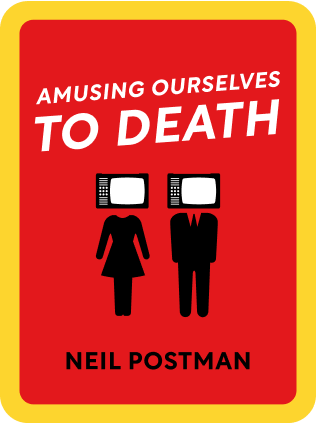

This article is an excerpt from the Shortform book guide to "Amusing Ourselves to Death" by Neil Postman. Shortform has the world's best summaries and analyses of books you should be reading.
Like this article? Sign up for a free trial here .
Why did Neil Postman think the future would look like Huxley’s Brave New World? How can changing how we watch tv help us avoid the Huxlean dystopia?
In Amusing Ourselves to Death, Neil Postman predicted that the future would look similar to the one depicted in Huxley’s dystopian novel Brave New World. Postman explains that the only way to avoid this fate is to see and question what we’re seeing rather than blindly trusting the media.
Keep reading for more on Neil Postman’s Brave New World future.
Orwell and Huxley’s Warnings
In the book Amusing Ourselves to Death, author Neil Postman thought a Brave New World dystopian future was imminent. When a nation defines its culture as non-stop entertainment, it’s at risk of cultural disintegration. In America, Huxley’s predictions are coming to fruition. With our full embrace of television, we’ve unconsciously undertaken an experiment in giving ourselves over to the distractions of technology.
An Orwellian threat would be more obvious—we know what authoritarianism looks like. But we haven’t recognized entertainment technology as our ideology. Like an ideology, television imposes a system of ideas and ideals, a way of life. It’s launched a cultural revolution in America without discussion, a vote, or resistance.
So how do we save ourselves from a Huxleyan fate? Of course, not everyone will think it’s necessary, but for those who do, there are only a few paths.
First, realize that Americans will never give up any technology. It also isn’t possible to limit people’s use of technology, although there may be temporary benefits from voluntary efforts like designating a TV turnoff month.
We could do more to limit certain content on television—like violence or ads on children’s shows—the way we banned cigarette advertising. Also, we could try to improve quality, but remember, television is most damaging when it co-opts serious discourse in news, politics, religion, science, or education, and turns it into entertainment. We’d be better off with bad television.
Changing How We Watch
Ultimately, the problem isn’t what we watch, it’s how. Since television is most dangerous when we’re oblivious to what it’s doing, the only viable solution is to see and question what we’re seeing. By asking questions, we demystify and break television’s or technology’s spell over us.
Some of the questions we should ask and answer are:
- What forms do various communications media take; how do they dictate intelligence, truth, and public discourse?
- How does each medium affect our thinking? What is it teaching us?
- What is the medium’s moral bias?
- How does the medium dictate the type of content it presents and how it presents it.
- How does the medium encourage or discourage thinking?
- How does the medium define cultural concepts such as patriotism, devoutness, privacy, being well-informed, or civic responsibility?
We don’t need to agree on the answers; just asking the questions activates and reorients our minds. These and other questions are as applicable to computers as to television. For instance, computers teach us that all we need in order to solve any problem is sufficient data. However, data won’t address most personal problems, and it may be that computers ultimately create as many problems as they solve.
Only by seeing and understanding what it’s doing can we hope to gain control over television, the computer, or any other technology. The problem in Huxley’s Brave New World wasn’t that people were happy and laughing without thinking. It was that they’d forgotten what they were laughing about and why they’d stopped thinking.

———End of Preview———
Like what you just read? Read the rest of the world's best book summary and analysis of Neil Postman's "Amusing Ourselves to Death" at Shortform .
Here's what you'll find in our full Amusing Ourselves to Death summary :
- How television reshaped our culture and trivialized public life by turning it into entertainment
- Why America is moving towards a dystopian, Huxleyan future
- What you can do to gain control over the technology in your life






